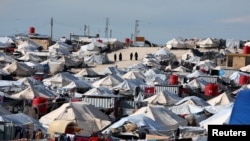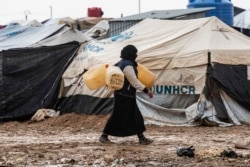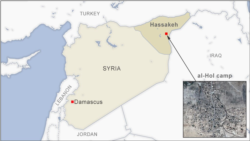A recent Turkish intelligence operation inside a camp holding thousands of displaced people, including families of Islamic State fighters, exposes serious security vulnerabilities that could harm U.S.-backed Syrian forces, officials and experts say.
Turkish intelligence agents in July infiltrated al-Hol camp in northeast Syria to smuggle out a Moldovan woman and her four children, Turkish media reported.
The escape has been confirmed by Syrian Democratic Forces (SDF) officials.
Al-Hol is home to tens of thousands of women and children linked to the Islamic State (IS) terror group. The U.S.-backed SDF provides security at al-Hol and runs several prisons in northeastern Syria that hold about 10,000 IS fighters, including 2,000 foreigners.
Smuggling networks
A senior SDF official who requested anonymity said since declaring the physical defeat of the IS so-called caliphate in March 2019, many women affiliated with the group have been smuggled out of the camp, with some taken to Turkey and others to rebel-held areas such as Idlib, in northwestern Syria.
“There are networks of smugglers who operate actively to smuggle Daesh women out of al-Hol,” he told VOA, using an Arabic acronym for IS.
He added that “these are well-connected transnational networks that often bribe camp guards” to smuggle women and children linked to IS, also known as ISIL.
A U.N. Security Council report released in late July said that “a steady stream of ISIL-affiliated women (is) reported to have escaped the camp into Turkey with the aid of corrupt guards and smugglers.”
The Turkish operation “shows that not only is the camp not entirely secure, but that it looks like Turkey is involved in other types of operations to smuggle people who might be potentially linked to extremists, if they themselves are not extremists,” said Seth Frantzman, director of the Middle East Center for Reporting and Analysis.
Vera Mironova, a research fellow at Harvard University, has been in contact with many women inside the camp.
“There are particular roads (for smuggling out women). As of last month, there were four ways to get out, and the majority of them go into Idlib,” she told VOA.
Moldovan case
The repatriation of the Moldovan woman and her four children was mainly reported by the pro-government media in the tiny eastern European nation, local experts said.
Identified as Natalia Barkal, the woman had been living with her children at al-Hol since January 2019, according to Moldovan and Turkish media reports.
Frantzman said the Turkish-Moldovan cooperation for smuggling out the Moldovan woman in Syria does not make “a lot of sense.”
“It is unclear why Turkey and Moldova would have to repatriate her using a clandestine intelligence network when Moldova could have just reached out to the international coalition and then to the autonomous region of the SDF in eastern Syria,” he said.
SDF officials themselves were uncertain why Turkey would publicize this operation.
Turkey has “carried out similar operations in the past quietly, but why make it public this time when it’s clear that it could damage the Turkish government politically?” an SDF official said.
Turkish and Moldovan foreign ministries have not responded to VOA’s requests for comment on this case.
Turkish President Recep Tayyip Erdogan said more countries are reaching out to his government seeking Turkish assistance to repatriate their citizens held in conflict zones.
“The number of countries that ask for our help to recover their kidnapped citizens continue to increase,” he said recently during the opening ceremony of the National Intelligence Organization’s (MIT) new service building in Istanbul.
“An Italian citizen (who) was recently rescued from terrorists in Somalia once again showed our country’s power and enhanced its prestige,” he added.
In the Moldovan case, experts believe the repatriation of Barkal and her children was presented as a political victory for Moldova’s ruling Socialist Party ahead of the presidential election in November.
“Moldovan President Igor Dodon wanted to take this success as his own success, his political success,” said Madalin Necsutu, a Moldovan journalist with the Balkan Investigative Reporting Network.
He told VOA that the Syria operation for Turkey could be the return of a favor after Dodon’s government helped extradite seven members of Turkey’s outlawed Gulen Movement from Moldova to Turkey in 2018.
“They were nabbed by the Turkish secret services in a joint operation with Moldovan secret services, and they are now in jail in Turkey,” Necsutu added.
No coalition troops
U.S. military officials say the U.S.-led coalition against IS has provided support to the SDF to guard al-Hol camp and other facilities holding IS fighters in Syria.
“There are no coalition forces, no military from any coalition nations inside these camps,” said Colonel Myles Caggins, spokesman for the U.S.-led coalition against IS.
“The SDF … are professional and quite capable of handling these operations, but there needs to be a solution. And the global coalition recognizes that this is an international problem, and each nation will have to make a decision about foreign fighters,” he told VOA during a recent visit to northeastern Syria.
In recent months, there have been several prison break attempts by IS prisoners held in a detention facility in the northeastern Syrian city of Hasakah.
SDF officials have called on countries to take back their detained citizens, cautioning that they do not have enough resources to keep IS prisoners and their families indefinitely.
Several countries, including the United States, Germany and France, have repatriated some of their citizens from Syria.
“The lack of an international will to address this pivotal dossier effectively means we could witness more infiltrations and security issues at (IS) camps and prisons in the future,” Sadradeen Kinno, a Syrian researcher, told VOA.
VOA’s Zana Omer contributed to this report from Hasakah, Syria.







